Configuration and Input
SqlCommandProvider parameters
| Name | Default | Accepted values |
| CommandText | - | T-SQL script or *.sql file |
| ConnectionStringOrName | - | Connection string or name |
| ResultType | ResultType.Records | Tuples, Records, DataTable, or DataReader |
| SingleRow | false | true/false |
| ConfigFile | app.config or web.config | Valid file name |
| AllParametersOptional | false | true/false |
| ResolutionFolder | The folder that contains the project or script. | Valid file system path. Absolute or relative. |
| DataDirectory | The name of the data directory that replaces |DataDirectory| in connection strings. The default value is the project or script directory. | Valid file system path. |
SqlProgrammabilityProvider parameters
| Name | Default | Accepted values |
| ConnectionStringOrName | - | Connection string or name |
| ConfigFile | app.config or web.config | valid file name |
| ResolutionFolder | The folder that contains the project or script. | Valid file system path. Absolute or relative. |
| DataDirectory | The name of the data directory that replaces |DataDirectory| in connection strings. The default value is the project or script directory. | Valid file system path. |
| UseReturnValue | false | Support for stored procedure return value. |
CommandText
T-SQL script
1: 2: 3: 4: 5: 6: 7: 8: 9: 10: 11: 12: 13: 14: 15: 16: 17: 18: 19: 20: 21: 22: 23: 24: 25: 26: 27: 28: 29: 30: 31: 32: 33: 34: 35: 36: 37: |
open FSharp.Data [<Literal>] let connStr = @"Data Source=.;Initial Catalog=AdventureWorks2012;Integrated Security=True" //Inline T-SQL text convinient for short queries type GetDate = SqlCommandProvider<"SELECT GETDATE() AS Now", connStr> //More complex queries are better off extracted to stand-alone literals //Fibonacci! Not again! :) [<Literal>] let fibonacci = " WITH Fibonacci ([N-1], N) AS ( --seed SELECT CAST(0 AS BIGINT), CAST(1 AS BIGINT) UNION ALL --fold SELECT N, [N-1] + N FROM Fibonacci ) SELECT TOP(@Top) [N-1] FROM Fibonacci " type FibonacciQuery = SqlCommandProvider<fibonacci, connStr> do let cmd = new FibonacciQuery(connStr) cmd.Execute(10L) |> Seq.map Option.get |> Seq.toArray |> printfn "First 10 fibonacci numbers: %A" |
External *.sql file
An ability to use external *.sql file instead of inline strings can improve developement experience. Visual Studio has rich tooling support for *.sql files. (via SQL Server Data Tools)
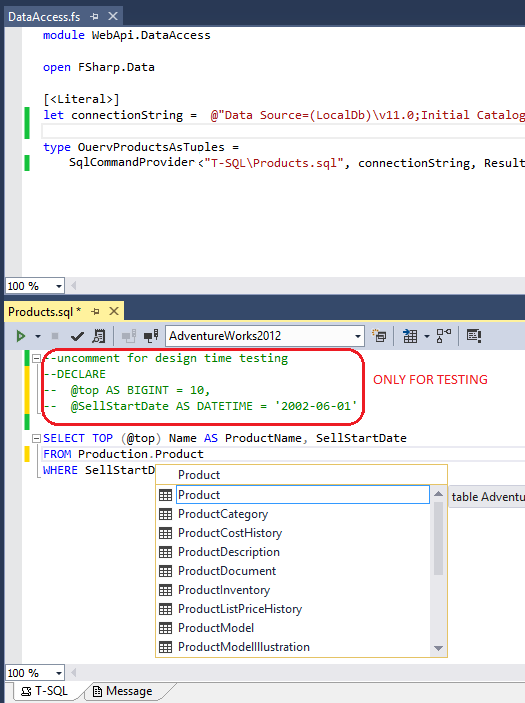
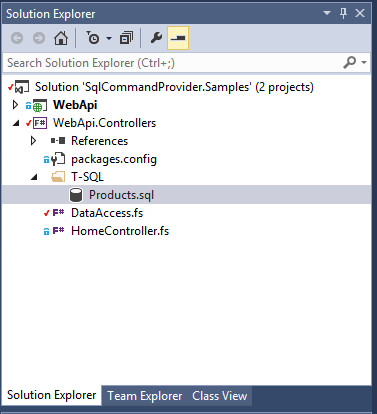
It offers following benefits:
- Intellisense in both F# and T-SQL code (it cannot get better)
- T-SQL syntax highlighting and verification
- Testing: query execution gives immediate feedback (small trick required - see the picture above)
- Clean separation between T-SQL and F# code
Having all data access layer logic in bunch of files in one location has clear advantage. For example, it can be handed over to DBA team for optimization. It's harder to do when application and data access are mixed together (LINQ).
1: 2: |
let cmd = new SqlCommandProvider<const(SqlFile<"GetDate.sql">.Text), connStr>(connStr) cmd.Execute() |> ignore |
Extracting T-SQL into external files is not the only way to scale application development. The other alternative is to push logic into programmable objects. I strongly recommend T-SQL functions because they have typical benefits of functional-first programming style: composition (therefore reuse), restricted side-effects and simple substitution model (easy to reason about). Stored procedures can be used too but they resemble imperative programming with all the drawbacks attached.
Below is an example of SQL Table-Valued Function usage.
1: 2: |
type GetContactInformation = SqlCommandProvider<"SELECT * FROM dbo.ufnGetContactInformation(@PersonId)", connStr> |
Syntax errors
The type provider shows fairly clear error message if there are any syntax errors in T-SQL.
An instantaneous feedback is one of the most handy features of SqlCommandProvider.
Limitation: a single parameter in a query may only be used once.
For example, an attempt to use following query will fail:
WHEN @x % 3 = 0 AND @x % 5 = 0 THEN 'FizzBuzz'
WHEN @x % 3 = 0 THEN 'Fizz'
WHEN @x % 5 = 0 THEN 'Buzz'
ELSE CAST(@x AS NVARCHAR)
You can work around this by declaring a local intermediate variable in t-sql script and assigning a parameter in question to that variable.
1: 2: 3: 4: 5: 6: 7: 8: 9: 10: 11: 12: |
type FizzOrBuzz = SqlCommandProvider<" DECLARE @x AS INT = @xVal SELECT CASE WHEN @x % 3 = 0 AND @x % 5 = 0 THEN 'FizzBuzz' WHEN @x % 3 = 0 THEN 'Fizz' WHEN @x % 5 = 0 THEN 'Buzz' ELSE CONCAT(@x, '') --use concat to avoid nullable column END", connStr> let fizzOrBuzz = new FizzOrBuzz(connStr) printfn "Answer on interview:\n%A" [ for i = 1 to 100 do yield! fizzOrBuzz.Execute(i) ] |
ConnectionStringOrName
Inline or literal
Connection string can be provided either via literal (all examples above) or inline
1: 2: 3: |
//Inline type Get42 = SqlCommandProvider<"SELECT 42", @"Data Source=.;Initial Catalog=AdventureWorks2012;Integrated Security=True"> |
The literal version is more practical because connection string definition can be shared between different declarations of SqlCommandProvider<...>.
By name
The other option is to supply connection string name from config file.
1: 2: 3: 4: 5: |
//default config file name is app.config or web.config type Get43 = SqlCommandProvider<"SELECT 43", "name=AdventureWorks"> //specify ANY other file name (including web.config) explicitly type Get44 = SqlCommandProvider<"SELECT 44", "name=AdventureWorks", ConfigFile = "user.config"> |
I would like to emphasize that ConfigFile is about design time only.
Let me give you couple examples to clarify:
You build Windows Service or WPF application.
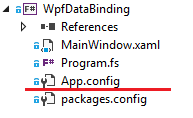 If it is a purely F# project and default app.config is there
If it is a purely F# project and default app.config is there ConfigFileparameter can be omitted. Still, in runtime the connection string with the same name should be available via .NET configuration infrastructure (ConfigurationManager). It means that either you have packaging/deployment system that knows how to fix connection string in config file to point to production database (for example, Slow Cheetah), or you do it manually after application is deployed.You have mixed ASP.NET WebAPI solution: C# hosting project and F# controllers implementation project.
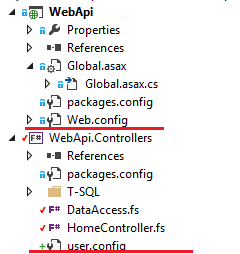 F# controllers project is a simple library project. It has data access layer module.
F# controllers project is a simple library project. It has data access layer module.
SqlCommandProvider<...>definitions refer to connection string by name form user.config file.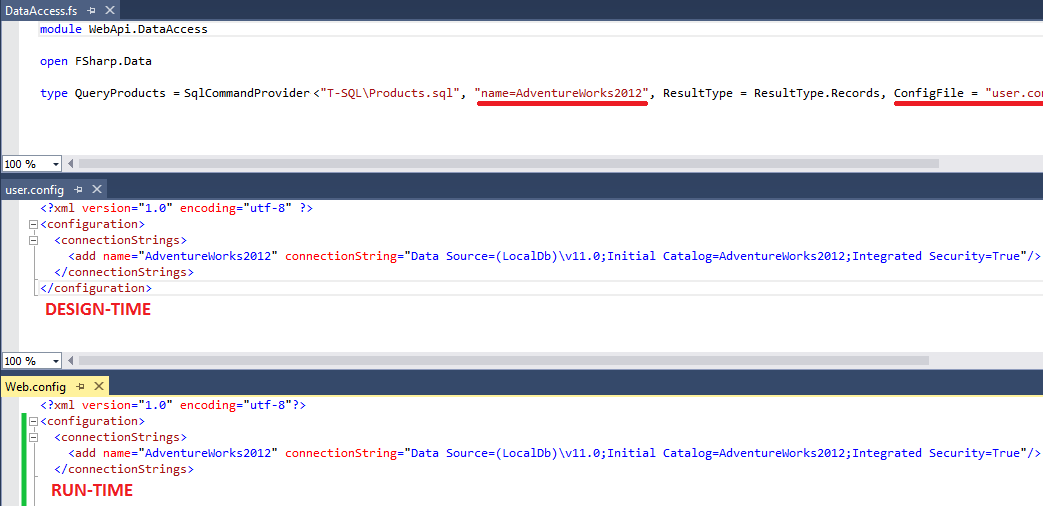 It's completely legitimate not to check-in this user.config file into source control system if it's developer specific.
Similar setup can be applied inside single project to separate user-specific configuration from common production config.
It's completely legitimate not to check-in this user.config file into source control system if it's developer specific.
Similar setup can be applied inside single project to separate user-specific configuration from common production config.
Overriding connection string at run-time
Run-time database connectivity configuration is rarely (almost never) the same as design-time.
All SqlCommandProvider<_>-generated types can be re-configured at run-time via optional constructor parameter.
The parameter is optional because "config file + name" approach is an acceptable way to have run-time configuration different from design-time.
Several use cases are possible:
1: 2: 3: 4: 5: 6: 7: 8: 9: 10: 11: 12: 13: 14: 15: 16: 17: 18: 19: 20: 21: 22: 23: 24: 25: 26: 27: 28: 29: 30: 31: 32: 33: 34: 35: 36: 37: 38: 39: 40: 41: 42: 43: 44: 45: 46: 47: 48: 49: 50: |
//Case 1: pass run-time connection string into ctor let runTimeConnStr = "..." //somehow get connection string at run-time let get42 = new Get42(runTimeConnStr) //Case 2: bunch of command types, single database //Factory or IOC of choice to avoid logic duplication. Use F# ctor static constraints. module DB = [<Literal>] let connStr = @"Data Source=.;Initial Catalog=AdventureWorks2012;Integrated Security=True" open System.Data.SqlClient type MyCmd1 = SqlCommandProvider<"SELECT 42", connStr> type MyCmd2 = SqlCommandProvider<"SELECT 42", connStr> let inline createCommand() : 'a = let runtimeConnStr = "..." //somehow get connection string at run-time //invoke ctor (^a : (new : string * int -> ^a) (runtimeConnStr, 30)) //or //(^a : (static member Create: string -> ^a) runtimeConnStr) let dbCmd1: DB.MyCmd1 = DB.createCommand() let dbCmd2: DB.MyCmd2 = DB.createCommand() //Case 3: multiple databases //It gets tricky because we need to distinguish between command types associated with different databases. //Static type property ConnectionStringOrName that has exactly same value as passed into SqlCommandProvider helps. module DataAccess = [<Literal>] let adventureWorks = @"Data Source=.;Initial Catalog=AdventureWorks2012;Integrated Security=True" [<Literal>] let master = @"Data Source=.;Initial Catalog=master;Integrated Security=True" type MyCmd1 = SqlCommandProvider<"SELECT 42", adventureWorks> type MyCmd2 = SqlCommandProvider<"SELECT 42", master> let inline createCommand() : 'a = let designTimeConnectionString = (^a : (static member get_ConnectionStringOrName : unit -> string) ()) let connStr = if designTimeConnectionString = adventureWorks then "..." //somehow get AdventureWorks connection string at run-time elif designTimeConnectionString = master then "..." //somehow get master connection string at run-time else failwith "Unexpected" //invoke ctor (^a : (new : string * int -> ^a) (connStr, 30)) let adventureWorksCmd: DataAccess.MyCmd1 = DataAccess.createCommand() let masterCmd: DataAccess.MyCmd2 = DataAccess.createCommand() |
Another related case, albeit not that common, is local transaction.
Important: SqlConnection associated with passed transaction, is not closed automatically in this case.
It is responsibility of the client code to close and dispose it.
1: 2: 3: 4: 5: 6: 7: 8: 9: 10: 11: 12: 13: 14: 15: 16: 17: 18: 19: 20: 21: 22: 23: 24: 25: 26: 27: 28: 29: 30: 31: 32: 33: 34: 35: |
[<Literal>] let bitCoinCode = "BTC" [<Literal>] let bitCoinName = "Bitcoin" type DeleteBitCoin = SqlCommandProvider<"DELETE FROM Sales.Currency WHERE CurrencyCode = @Code" , connStr> type InsertBitCoin = SqlCommandProvider<"INSERT INTO Sales.Currency VALUES(@Code, @Name, GETDATE())" , connStr> type GetBitCoin = SqlCommandProvider<"SELECT CurrencyCode, Name FROM Sales.Currency WHERE CurrencyCode = @code" , connStr> do let cmd = new DeleteBitCoin(connStr) in cmd.Execute(bitCoinCode) |> ignore let conn = new System.Data.SqlClient.SqlConnection(connStr) conn.Open() let tran = conn.BeginTransaction() let cmd = new SqlCommandProvider<" INSERT INTO Sales.Currency VALUES(@Code, @Name, GETDATE()) ", connStr>(connStr) use insert = InsertBitCoin.Create(conn, transaction = tran) assert(insert.Execute(bitCoinCode, bitCoinName) = 1) use get = new GetBitCoin(conn, transaction = tran) assert( get.Execute(bitCoinCode) |> Seq.length = 1) tran.Rollback() assert( GetBitCoin.Create(connStr).Execute(bitCoinCode) |> Seq.length = 0) |
It is worth noting that because of "erased types" nature of this type provider reflection and other dynamic techniques cannot be used to create command instances.
SqlProgrammabilityProvider<...> supports connection name syntax as well.
1: 2: 3: |
open System type AdventureWorks2012 = SqlProgrammabilityProvider<connStr> |
Optional input parameters
By default all input parameters of AsyncExecute/Execute generated by SqlCommandProvider<...> are mandatory.
But there are rare cases when you prefer to handle NULL input values inside T-SQL script.
AllParametersOptional set to true makes all parameters (guess what) optional.
1: 2: 3: 4: 5: 6: 7: 8: 9: |
type IncrBy = SqlCommandProvider<"SELECT @x + ISNULL(CAST(@y AS INT), 1) ", connStr, AllParametersOptional = true, SingleRow = true> let incrBy = new IncrBy(connStr) //pass both params passed incrBy.Execute(Some 10, Some 2) = Some( Some 12) //true //omit second parameter. default to 1 incrBy.Execute(Some 10) = Some( Some 11) //true |
Note that AllParametersOptional is not supported by SQlProgrammabilityProvider<...> as it is able to
infer default values for Stored Procedures and UDFs so AsyncExecute signature makes corresponding parameters optional.
Table-valued parameters (TVPs)
Sql command needs to call a stored procedure or user-defined function that takes a parameter of table-valued type.
Set up sample type and sproc:
CREATE TYPE dbo.myTableType AS TABLE (myId int not null, myName nvarchar(30) null)
GO
CREATE PROCEDURE myProc
@p1 dbo.myTableType readonly
AS
BEGIN
SELECT myName from @p1 p
END
1: 2: 3: 4: 5: |
type TableValuedSample = SqlCommandProvider<"exec myProc @x", connStr> type TVP = TableValuedSample.MyTableType let tvpSp = new TableValuedSample(connStr) //nullable columns mapped to optional ctor params tvpSp.Execute(x = [ TVP(myId = 1, myName = Some "monkey"); TVP(myId = 2) ]) |
Same with SqlProgrammabilityProvider<...>
1: 2: 3: 4: 5: |
type T = AdventureWorks2012.dbo.``User-Defined Table Types``.MyTableType do use cmd = new AdventureWorks2012.dbo.MyProc(connStr) cmd.Execute([ T(myId = 2); T(myId = 1) ]) |> printfn "%A" |
Stored procedures
Command types generated by SqlProgrammabilityProvider<...> largely have same interface with exceptions:
There is no static Create factory method because intellisense issue doesnt exist for these types
There is additional ExecuteSingle/ AsyncExecuteSingle to opt-in for singleton result set.
1: 2: 3: 4: 5: 6: 7: 8: 9: 10: 11: |
do use cmd = new AdventureWorks2012.dbo.uspGetWhereUsedProductID(connStr) //sync cmd.Execute( StartProductID = 1, CheckDate = DateTime(2013,1,1)) |> printfn "%A" //async cmd.AsyncExecute( StartProductID = 1, CheckDate = DateTime(2013,1,1)) |> Async.RunSynchronously |> Array.ofSeq |> printfn "%A" |
Stored Procedures output parameters are mapped into F# byref method parameters. Because byref parameters cannot be combined with lazily evaluated computation expression, AsyncExecute and AsyncExecuteSingle methods are not provided.
1: 2: 3: 4: 5: 6: 7: 8: 9: 10: 11: 12: 13: 14: 15: 16: 17: |
do use cmd = new AdventureWorks2012.dbo.uspLogError(connStr) let errorLogId = ref -1 let recordsAffected = cmd.Execute(errorLogId) printfn "errorLogId: %i" !errorLogId do //tupled invocation syntax //works only in VS 2015 or later because of F# compiler bug use cmd = new AdventureWorks2012.dbo.uspLogError(connStr) let _, errorLogId = cmd.Execute() printfn "errorLogId: %i" errorLogId do //mutable bindgings use cmd = new AdventureWorks2012.dbo.uspLogError(connStr) let mutable errorLogId = -1 let recordsAffected = cmd.Execute(&errorLogId) printfn "errorLogId: %i" errorLogId |
By default stored procedure return values are not surfaced. To make it available specify UseReturnValue = true static parameter of SqlProgrammabilityProvider. RETURN_VALUE will be the last byref parameter.
1: 2: 3: 4: 5: |
do use cmd = new SqlProgrammabilityProvider<connStr, UseReturnValue = true>.dbo.uspLogError(connStr) let recordsAffected, errorLogId, returnValue = cmd.Execute() printfn "recordsAffected: %i, errorLogId: %i, returnValue: %i" recordsAffected errorLogId returnValue |
Things get interesting when stored procedure return both set of rows and output parameters. I won't show any sample code because AdventureWorks database doesn't have such procedure. But the only change comparing to non-query stored procedure that instead of returning number of affected records it returns F# list of records. Notice that list is data structure as oppose to lazy evaluated seq<_> computation. This caused by a fact Sql Server + ADO.NET populates output parameter only after row set reader is closed. See [http://stackoverflow.com/questions/65662/output-parameters-not-readable-when-used-with-a-datareader].
type LiteralAttribute =
inherit Attribute
new : unit -> LiteralAttribute
Full name: Microsoft.FSharp.Core.LiteralAttribute
--------------------
new : unit -> LiteralAttribute
Full name: Configuration and Input.connStr
Full name: Configuration and Input.GetDate
Full name: Configuration and Input.fibonacci
Full name: Configuration and Input.FibonacciQuery
from Microsoft.FSharp.Collections
Full name: Microsoft.FSharp.Collections.Seq.map
from Microsoft.FSharp.Core
Full name: Microsoft.FSharp.Core.Option.get
Full name: Microsoft.FSharp.Collections.Seq.toArray
Full name: Microsoft.FSharp.Core.ExtraTopLevelOperators.printfn
Full name: Configuration and Input.cmd
Full name: Microsoft.FSharp.Core.Operators.ignore
Full name: Configuration and Input.GetContactInformation
Full name: Configuration and Input.FizzOrBuzz
Full name: Configuration and Input.fizzOrBuzz
Full name: Configuration and Input.Get42
Full name: Configuration and Input.Get43
Full name: Configuration and Input.Get44
Full name: Configuration and Input.runTimeConnStr
Full name: Configuration and Input.get42
Full name: Configuration and Input.DB.connStr
Full name: Configuration and Input.DB.MyCmd1
Full name: Configuration and Input.DB.MyCmd2
Full name: Configuration and Input.DB.createCommand
val string : value:'T -> string
Full name: Microsoft.FSharp.Core.Operators.string
--------------------
type string = System.String
Full name: Microsoft.FSharp.Core.string
val int : value:'T -> int (requires member op_Explicit)
Full name: Microsoft.FSharp.Core.Operators.int
--------------------
type int = int32
Full name: Microsoft.FSharp.Core.int
--------------------
type int<'Measure> = int
Full name: Microsoft.FSharp.Core.int<_>
Full name: Configuration and Input.dbCmd1
from Configuration and Input
Full name: Configuration and Input.dbCmd2
Full name: Configuration and Input.DataAccess.adventureWorks
Full name: Configuration and Input.DataAccess.master
Full name: Configuration and Input.DataAccess.MyCmd1
Full name: Configuration and Input.DataAccess.MyCmd2
Full name: Configuration and Input.DataAccess.createCommand
Full name: Microsoft.FSharp.Core.unit
Full name: Microsoft.FSharp.Core.Operators.failwith
Full name: Configuration and Input.adventureWorksCmd
from Configuration and Input
Full name: Configuration and Input.masterCmd
Full name: Configuration and Input.bitCoinCode
Full name: Configuration and Input.bitCoinName
Full name: Configuration and Input.DeleteBitCoin
Full name: Configuration and Input.InsertBitCoin
Full name: Configuration and Input.GetBitCoin
type SqlConnection =
inherit DbConnection
new : unit -> SqlConnection + 1 overload
member BeginTransaction : unit -> SqlTransaction + 3 overloads
member ChangeDatabase : database:string -> unit
member Close : unit -> unit
member ConnectionString : string with get, set
member ConnectionTimeout : int
member CreateCommand : unit -> SqlCommand
member DataSource : string
member Database : string
member EnlistDistributedTransaction : transaction:ITransaction -> unit
...
Full name: System.Data.SqlClient.SqlConnection
--------------------
System.Data.SqlClient.SqlConnection() : unit
System.Data.SqlClient.SqlConnection(connectionString: string) : unit
Full name: Microsoft.FSharp.Collections.Seq.length
System.Data.SqlClient.SqlTransaction.Rollback(transactionName: string) : unit
Full name: Configuration and Input.AdventureWorks2012
Full name: Configuration and Input.IncrBy
Full name: Configuration and Input.incrBy
Full name: Configuration and Input.TableValuedSample
Full name: Configuration and Input.TVP
Full name: Configuration and Input.tvpSp
Full name: Configuration and Input.T
type DateTime =
struct
new : ticks:int64 -> DateTime + 10 overloads
member Add : value:TimeSpan -> DateTime
member AddDays : value:float -> DateTime
member AddHours : value:float -> DateTime
member AddMilliseconds : value:float -> DateTime
member AddMinutes : value:float -> DateTime
member AddMonths : months:int -> DateTime
member AddSeconds : value:float -> DateTime
member AddTicks : value:int64 -> DateTime
member AddYears : value:int -> DateTime
...
end
Full name: System.DateTime
--------------------
DateTime()
(+0 other overloads)
DateTime(ticks: int64) : unit
(+0 other overloads)
DateTime(ticks: int64, kind: DateTimeKind) : unit
(+0 other overloads)
DateTime(year: int, month: int, day: int) : unit
(+0 other overloads)
DateTime(year: int, month: int, day: int, calendar: Globalization.Calendar) : unit
(+0 other overloads)
DateTime(year: int, month: int, day: int, hour: int, minute: int, second: int) : unit
(+0 other overloads)
DateTime(year: int, month: int, day: int, hour: int, minute: int, second: int, kind: DateTimeKind) : unit
(+0 other overloads)
DateTime(year: int, month: int, day: int, hour: int, minute: int, second: int, calendar: Globalization.Calendar) : unit
(+0 other overloads)
DateTime(year: int, month: int, day: int, hour: int, minute: int, second: int, millisecond: int) : unit
(+0 other overloads)
DateTime(year: int, month: int, day: int, hour: int, minute: int, second: int, millisecond: int, kind: DateTimeKind) : unit
(+0 other overloads)
type Async
static member AsBeginEnd : computation:('Arg -> Async<'T>) -> ('Arg * AsyncCallback * obj -> IAsyncResult) * (IAsyncResult -> 'T) * (IAsyncResult -> unit)
static member AwaitEvent : event:IEvent<'Del,'T> * ?cancelAction:(unit -> unit) -> Async<'T> (requires delegate and 'Del :> Delegate)
static member AwaitIAsyncResult : iar:IAsyncResult * ?millisecondsTimeout:int -> Async<bool>
static member AwaitTask : task:Task<'T> -> Async<'T>
static member AwaitWaitHandle : waitHandle:WaitHandle * ?millisecondsTimeout:int -> Async<bool>
static member CancelDefaultToken : unit -> unit
static member Catch : computation:Async<'T> -> Async<Choice<'T,exn>>
static member FromBeginEnd : beginAction:(AsyncCallback * obj -> IAsyncResult) * endAction:(IAsyncResult -> 'T) * ?cancelAction:(unit -> unit) -> Async<'T>
static member FromBeginEnd : arg:'Arg1 * beginAction:('Arg1 * AsyncCallback * obj -> IAsyncResult) * endAction:(IAsyncResult -> 'T) * ?cancelAction:(unit -> unit) -> Async<'T>
static member FromBeginEnd : arg1:'Arg1 * arg2:'Arg2 * beginAction:('Arg1 * 'Arg2 * AsyncCallback * obj -> IAsyncResult) * endAction:(IAsyncResult -> 'T) * ?cancelAction:(unit -> unit) -> Async<'T>
static member FromBeginEnd : arg1:'Arg1 * arg2:'Arg2 * arg3:'Arg3 * beginAction:('Arg1 * 'Arg2 * 'Arg3 * AsyncCallback * obj -> IAsyncResult) * endAction:(IAsyncResult -> 'T) * ?cancelAction:(unit -> unit) -> Async<'T>
static member FromContinuations : callback:(('T -> unit) * (exn -> unit) * (OperationCanceledException -> unit) -> unit) -> Async<'T>
static member Ignore : computation:Async<'T> -> Async<unit>
static member OnCancel : interruption:(unit -> unit) -> Async<IDisposable>
static member Parallel : computations:seq<Async<'T>> -> Async<'T []>
static member RunSynchronously : computation:Async<'T> * ?timeout:int * ?cancellationToken:CancellationToken -> 'T
static member Sleep : millisecondsDueTime:int -> Async<unit>
static member Start : computation:Async<unit> * ?cancellationToken:CancellationToken -> unit
static member StartAsTask : computation:Async<'T> * ?taskCreationOptions:TaskCreationOptions * ?cancellationToken:CancellationToken -> Task<'T>
static member StartChild : computation:Async<'T> * ?millisecondsTimeout:int -> Async<Async<'T>>
static member StartChildAsTask : computation:Async<'T> * ?taskCreationOptions:TaskCreationOptions -> Async<Task<'T>>
static member StartImmediate : computation:Async<unit> * ?cancellationToken:CancellationToken -> unit
static member StartWithContinuations : computation:Async<'T> * continuation:('T -> unit) * exceptionContinuation:(exn -> unit) * cancellationContinuation:(OperationCanceledException -> unit) * ?cancellationToken:CancellationToken -> unit
static member SwitchToContext : syncContext:SynchronizationContext -> Async<unit>
static member SwitchToNewThread : unit -> Async<unit>
static member SwitchToThreadPool : unit -> Async<unit>
static member TryCancelled : computation:Async<'T> * compensation:(OperationCanceledException -> unit) -> Async<'T>
static member CancellationToken : Async<CancellationToken>
static member DefaultCancellationToken : CancellationToken
Full name: Microsoft.FSharp.Control.Async
--------------------
type Async<'T>
Full name: Microsoft.FSharp.Control.Async<_>
member Clone : unit -> obj
member CopyTo : array:Array * index:int -> unit + 1 overload
member GetEnumerator : unit -> IEnumerator
member GetLength : dimension:int -> int
member GetLongLength : dimension:int -> int64
member GetLowerBound : dimension:int -> int
member GetUpperBound : dimension:int -> int
member GetValue : params indices:int[] -> obj + 7 overloads
member Initialize : unit -> unit
member IsFixedSize : bool
...
Full name: System.Array
Full name: Microsoft.FSharp.Collections.Array.ofSeq
val ref : value:'T -> 'T ref
Full name: Microsoft.FSharp.Core.Operators.ref
--------------------
type 'T ref = Ref<'T>
Full name: Microsoft.FSharp.Core.ref<_>

